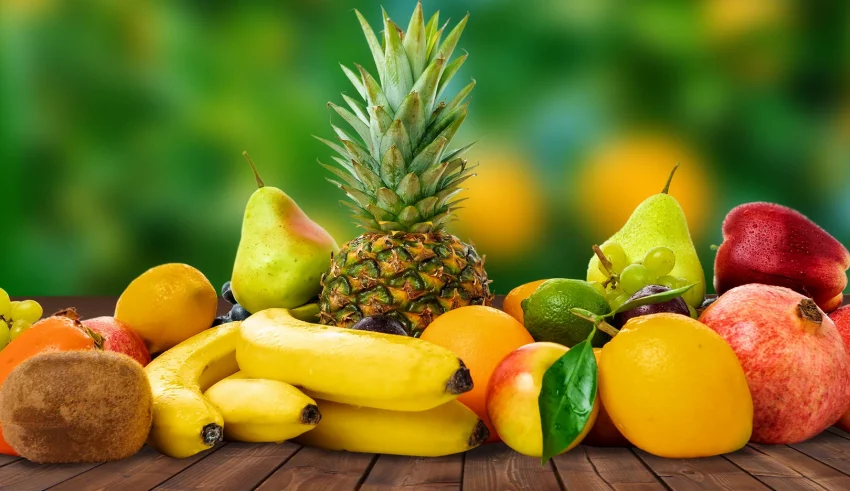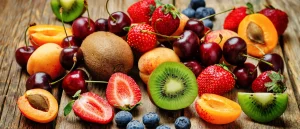
“An apple a day keeps the doctor away,” the saying goes. Health professionals know that fruit is a highly nutritious, delicious, and convenient addition to any diet. With over 2,000 varieties of fruits available, you may be wondering which ones to choose.
Each type of fruit provides its own unique set of nutrients and benefits. The key is to eat different colors of fruit, as each color provides a different set of healthy nutrients.
In this article from The Dermo Lab, we look at the varied nutrients and benefits of the healthiest fruits you can find at the supermarket.
12 healthy and super nutritious fruits
- Apples
Apples, which are one of the most popular fruits, are packed with nutrients.
They are rich in soluble and insoluble fibers, such as pectin, hemicellulose, and cellulose. These fibers help you manage blood sugar, promote good digestion and support intestinal and heart health.
In addition, they are a good source of vitamin C and plant polyphenols, which are disease-fighting compounds found in plants. In fact, regular consumption of apples can reduce the risk of heart disease, stroke, cancer, overweight, obesity, and neurological disorders.
Note that most of the polyphenols in apples are located just under the skin. So, make sure you eat it to get the best benefits.
- Blueberries
Blueberries are widely known for their antioxidant and anti-inflammatory properties.
In particular, they are rich in anthocyanin, a plant pigment, and flavonoid that gives blueberries their characteristic blue-purple color. This compound helps fight free radicals that damage cells and can lead to disease.
Numerous studies have highlighted the health benefits of a diet rich in anthocyanins, such as a lower risk of type 2 diabetes, heart disease, overweight, obesity, high blood pressure, and certain types of cancer.
- Avocado
Unlike most other fruits, avocados are high in healthy fats and low in natural sugars.
They are primarily composed of oleic acid, a monounsaturated fat linked to better heart health. They also contain high amounts of potassium, fiber, vitamin B6, folate, vitamins E and K, as well as two carotenoids, lutein, and zeaxanthin, which promote eye health.
- Bananas
The health benefits of bananas reach beyond their potassium content. In addition to potassium, bananas contain:
- Vitamin B6
- Vitamin C
- Magnesium
In addition, they offer a wide variety of plant compounds called polyphenols and phytosterols, both of which contribute to your overall health. In addition, they are loaded with prebiotics, a type of fiber that stimulates the growth of beneficial bacteria in the gut.
- Strawberries
Strawberries are a favorite fruit of many. They are delicious, convenient, and highly nutritious. Particularly, strawberries are a great source of vitamin C, folate, and manganese.
They are full of plant polyphenols that act as antioxidants, such as flavonoids, phenolic acids, lignans, and tannins.
In particular, they are rich in anthocyanins, ellagitannins, and proanthocyanidins, which studies have shown to reduce the risk of chronic diseases.
In addition, they have a low glycemic index, which means they won’t significantly affect your blood sugar levels.
- Kiwi
Kiwi fruit is excellent for your health. It is rich in vitamin C and is a good source of fiber, potassium, folic acid, and vitamin E. It is also a good source of carotenoids, including lutein, zeaxanthin, and beta-carotene, which contribute to eye health and become more dominant as the fruit ripens.
In addition, people have used it in traditional Chinese medicine for hundreds of years to support intestinal health and digestion. These benefits are due to its soluble and insoluble fiber, polyphenols, and digestive enzymes like actinidin.
A small study showed that eating 2 kiwis a day for 3 days increased the frequency of bowel movements and softened stools, suggesting that it may help treat mild constipation.
- Oranges
Oranges are high in vitamin C. They are also very rich in potassium, folate, thiamine, fiber, and plant polyphenols.
Studies have shown that eating whole oranges can reduce inflammation levels, blood pressure, cholesterol, and postprandial blood sugar.
Although 100% orange juice provides a high volume of nutrients and antioxidants, it generally lacks dietary fiber. Varieties that include pulp do contain fiber, so choose them over pulp-free juice. That said, try to eat whole oranges more often.
- Watermelon
Watermelon is one of the summer’s favorite nutritious foods. It is a rich source of antioxidants, such as vitamins A and C, beta-carotene, and lycopene. It is also a good source of potassium and magnesium.
In particular, watermelon is one of the best sources of lycopene, a carotenoid that gives watermelon its pink-red color. A diet rich in lycopene is linked to lower levels of oxidative stress and inflammation. This nutrient may also reduce the risk of heart disease, cancer, and type 2 diabetes.
Interestingly, lycopene and beta-carotene may also provide minor skin protection against ultraviolet (UV) rays, reduce the risk of sunburn and help your skin heal faster.
Finally, watermelon has an exceptionally high-water content. Because it is rich in water and potassium, it can help hydrate and replenish electrolytes after a workout or on a hot summer day.
- Cherries
Cherries provide an excellent source of fiber and potassium, which are both important for heart and gut health.
They are also rich in antioxidant plant compounds, such as anthocyanins and hydroxycinnamates, which help protect the body from oxidative stress.
In addition, they are a good source of serotonin, tryptophan, and melatonin, which promote good mood and sleep.
- Pineapple
Pineapple is one of the world’s most popular tropical fruits.
Pineapples contain manganese, which is used by the body to build bone and tissue. Pineapple is also packed with several polyphenolic compounds that have antioxidant and anti-inflammatory properties.
In addition, pineapple contains an active compound called bromelain, which many people take as a dietary supplement because of its potential health benefits. Bromelain may help reduce nasal inflammation or sinusitis, although research on this is limited.
- Pomegranates
Pomegranates are renowned for their high antioxidant content.
They contain a long list of beneficial plant compounds, such as flavonoids, tannins, and lignans. These have strong antioxidant and anti-inflammatory properties that help fight free radicals and reduce the risk of chronic diseases.
A review study on the health benefits of pomegranate suggests that it may help protect against brain-related diseases, such as Alzheimer’s and Parkinson’s. This may be due to the fact that pomegranates contain particularly high levels of polyphenols.
- Peaches
Peaches are another summer favorite. They are a good source of potassium, fiber, and vitamins A, C, and E. They also contain the carotenoids lutein, zeaxanthin, and beta-carotene.
While both the flesh and skin are nutritious, the skin contains higher amounts of antioxidants, which can help fight free radicals in your body. Therefore, make sure to eat the skin of the peach to get the maximum health benefits.
The basics
Fruit comes in all shapes and sizes, and each fruit has different health benefits.
By eating fruit, you are providing your body with essential vitamins, antioxidants, and dietary fiber. This can have significant benefits for heart health, digestion, weight management, and skin health.
While this list contains 12 of the most nutritious fruits, there are many others to choose from. To get the most benefit, make sure you eat a variety of colorful fruits daily.
Last Updated on December 11, 2023









